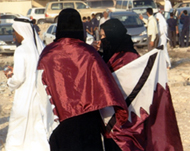Qatar to adopt first constitution
The oil-rich Gulf nation of Qatar on Thursday is set to sign into effect a constitution for the first time in its history, establishing democratic reforms in a country ruled by monarchy.

Calling the event “historic and glorious,” Justice Ministry secretary of state Sultan bin Abdallah al-Suidi told reporters the constitution would boost Qatar to an “advanced level of civilisation”.
Qatar’s first constitution since independence from Britain in 1971 will leave real power with the amir and his family but give citizens a greater say in the running of their country.
Greater freedoms
The constitution allows for free speech, a free press and freedom of assembly “according to the law”, but does not allow for the formation of political parties and stipulates that no changes can be made to the document for the first 10 years it is in effect.
“Qatar is an independent and sovereign Arab country,” Article One says. “Its religion is Islam and sharia (Islamic law) is the main source of legislation. Its regime is democratic and its official language is Arabic.”
|
“In an increasingly globalised economy, our efforts must reconcile the requirements of political reform and economic justice” Amir Hamad Bin Khalifa Al-Thani |
The Al-Thani family has been dominant in Qatar – a peninsula bordering Saudi Arabia that is abundant in natural gas and oil – since the mid-1800s, and until now has retained absolute control over all aspects of government.
The amir, Shaikh Hamad Bin Khalifa Al-Thani, has advocated greater political openness since taking power in 1995.
Separation of powers
The constitution clears the way for the separation of executive, legislative and judiciary branches and allows 45 members of parliament to be elected. The amir reserves the power to appoint the remaining 15 members.
“The constitution places Qatar at the heart of modernity and democracy,” said Yussef Abidan, a member of the constitutional drafting committee.
Ninety-six percent of voters approved the constitution by referendum in April 2003.
About 71,400 Qataris were eligible to vote in the referendum. Qatar has only about 150,000 nationals out of a population of
650,000, mostly expatriate workers.
No outside pressure
During a Forum on Democracy and Free Trade in Doha in March, Al-Thani said reforms should be genuine and not in response to outside pressure.
It is not enough to introduce “partial amendments to avoid criticism or ease pressure”, he said, apparently referring to US pressure on Arab countries to introduce political and economic reforms.
Reform now has “new supporters… (after only) few voices pinned hopes on the birth of the era of democracy in the region”, he said.
Qatar’s support of democracy has made the emirate a close US ally, and Washington has applauded Qatar’s moves towards democratisation.
US military base
 |
|
Qatari women are increasingly |
The US military maintains a large base in Qatar and used the Gulf outpost during the 2003 war on Iraq. Al-Thani has also promoted economic reforms, saying that fairer distribution of wealth was a prerequisite to stability.
The amir opened Qatar’s economy to foreign investors and allowed them to purchase up to 25% of companies listed on Qatar’s stock exchange.
“In an increasingly globalised economy, our common efforts must reconcile the requirements of political reform and economic justice,” he told the democracy gathering.
Women promoted
Al-Thani gave women the right to vote and named several women to head official institutions. In 2004 Qatar organised a a conference on human rights, a rare event in a region often accused of violating human rights.
“The democratic process has now been launched,” said academic Mohammed al-Mesfer. “I hope this democratic initiative will become widespread in all the Gulf countries.”